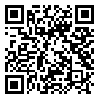Volume 15, Issue 1 (Apr & May 2021)
payavard 2021, 15(1): 84-97 |
Back to browse issues page
Ethics code: IR.ATU.REC.1399.031
Download citation:
BibTeX | RIS | EndNote | Medlars | ProCite | Reference Manager | RefWorks
Send citation to:



BibTeX | RIS | EndNote | Medlars | ProCite | Reference Manager | RefWorks
Send citation to:
Abdolahi N, Nili Ahmadabadi M R N, Ebrahimi Qavam S, Aliabadi K, Asgari M. Instructional Design Model Based on Control-Value Theory of Achievement Emotions and Its Effectiveness on Academic Achievement Motivation and Self-Regulated Learning. payavard 2021; 15 (1) :84-97
URL: http://payavard.tums.ac.ir/article-1-7087-en.html
URL: http://payavard.tums.ac.ir/article-1-7087-en.html
Nida Abdolahi * 
 1, Mohamad Reza Nili Nili Ahmadabadi2
1, Mohamad Reza Nili Nili Ahmadabadi2 
 , Soghra Ebrahimi Qavam3
, Soghra Ebrahimi Qavam3 
 , Khadijeh Aliabadi2
, Khadijeh Aliabadi2 
 , Mohammad Asgari4
, Mohammad Asgari4 


 1, Mohamad Reza Nili Nili Ahmadabadi2
1, Mohamad Reza Nili Nili Ahmadabadi2 
 , Soghra Ebrahimi Qavam3
, Soghra Ebrahimi Qavam3 
 , Khadijeh Aliabadi2
, Khadijeh Aliabadi2 
 , Mohammad Asgari4
, Mohammad Asgari4 

1- Ph.D. Candidate in Instructional Technology, Faculty of Psychology and Educational Sciences, Allameh Tabataba’i University, Tehran, Iran , abdolahi_n@atu.ac.ir
2- Associate Professor, Department of Instructional Technology, Faculty of Psychology and Educational Sciences, Allameh Tabataba’i University, Tehran, Iran
3- Associate Professor, Department of Educational Psychology, Faculty of Psychology and Educational Sciences, Allameh Tabataba’i University, Tehran, Iran
4- Associate Professor, Department of Assessment and measurement, Faculty of Psychology and Educational Sciences, Allameh Tabataba’i University, Tehran, Iran
2- Associate Professor, Department of Instructional Technology, Faculty of Psychology and Educational Sciences, Allameh Tabataba’i University, Tehran, Iran
3- Associate Professor, Department of Educational Psychology, Faculty of Psychology and Educational Sciences, Allameh Tabataba’i University, Tehran, Iran
4- Associate Professor, Department of Assessment and measurement, Faculty of Psychology and Educational Sciences, Allameh Tabataba’i University, Tehran, Iran
Abstract: (2333 Views)
Background and Aim: Deep and sustainable learning requires a safe and healthy environment. Moreover, paying attention to the intertwined emotional, motivational, cognitive and social processes in the teaching-learning process is vital. Academic achievement motivation and self-regulated learning (SRL) are two important elements in this process that are influenced by the achievement emotions in the learning environment. Therefore, the aim of this study is to evaluate the effectiveness of instructional design model based on control-value theory of achievement emotions (CVT), on academic achievement motivation and self-regulation learning.
Materials and Methods: The research was quantitative and performed by Nonequlment design control group. The statistical population included female second year high school students in Tehran in the academic year of 1997-98, who were selected by multi-stage cluster random sampling in two experimental and control groups. The experimental group was trained according to the instructional design model based on CVT theory and the control group did not receive this training method. The questionnaire of academic achievement motivation and self-regulated learning was administered to the experimental and control groups as pre-test and post-test before and after the implementation of the model. Data were analyzed by inferential and descriptive statistics using SPSS software and multivariate covariance.
Results: The results of univariate analysis of covariance of group effect on the scores of dependent variables show that there is a significant difference between the experimental and control groups in cognitive strategy (F=11/94, P>0/05, η2=0/14), metacognition strategy (F=56/06, P>0/05, η2=0/44), motivational beliefs (F=6/36, P>0/05, η2=0/08) and academic achievement motivation (F=10/69, P>0/05, η2 =0/13).
Conclusion: The result of this study show that the use of instructional design model based on CVT theory has a positive effect on cognitive strategies, metacognition strategies, motivational beliefs and learners' academic achievement motivation.
Materials and Methods: The research was quantitative and performed by Nonequlment design control group. The statistical population included female second year high school students in Tehran in the academic year of 1997-98, who were selected by multi-stage cluster random sampling in two experimental and control groups. The experimental group was trained according to the instructional design model based on CVT theory and the control group did not receive this training method. The questionnaire of academic achievement motivation and self-regulated learning was administered to the experimental and control groups as pre-test and post-test before and after the implementation of the model. Data were analyzed by inferential and descriptive statistics using SPSS software and multivariate covariance.
Results: The results of univariate analysis of covariance of group effect on the scores of dependent variables show that there is a significant difference between the experimental and control groups in cognitive strategy (F=11/94, P>0/05, η2=0/14), metacognition strategy (F=56/06, P>0/05, η2=0/44), motivational beliefs (F=6/36, P>0/05, η2=0/08) and academic achievement motivation (F=10/69, P>0/05, η2 =0/13).
Conclusion: The result of this study show that the use of instructional design model based on CVT theory has a positive effect on cognitive strategies, metacognition strategies, motivational beliefs and learners' academic achievement motivation.
Keywords: nstructional Design Model, Control-Value Theory, Achievement Emotions, Academic Achievement Motivation, Self-Regulation Learning
Send email to the article author
| Rights and permissions | |
 |
This work is licensed under a Creative Commons Attribution-NonCommercial 4.0 International License. |




